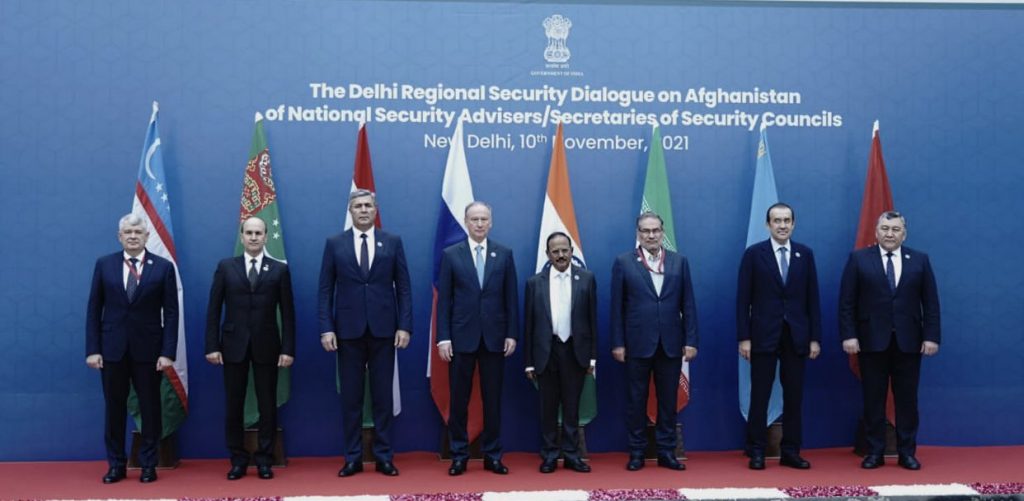
India hosted the “Delhi Regional Security Dialogue on Afghanistan” on 10 November which saw the participation of Iran, Kazakhstan, Kyrgyz Republic, Russia, Tajikistan, Turkmenistan and Uzbekistan, who were represented by their respective National Security Advisers / Secretaries of the Security Councils. The Dialogue held at the level of National Security Advisers / Secretaries of Security Councils was chaired by India’s National Security Adviser, Ajit Doval. The first two editions of the Dialogue were hosted by the Islamic Republic of Iran in 2018 and 2019.
The expanded high level Dialogue reviewed the security situation in the region arising from recent developments in Afghanistan. The members deliberated upon measures to address the relevant security challenges and support the people of Afghanistan in promoting peace, security and stability.
India has traditionally enjoyed close and friendly ties with the people of Afghanistan and has called for a unified international response to address the security and humanitarian challenges facing Afghanistan. The Delhi Regional Security Dialogue was a step in this direction, said the Ministry of External Affairs.
The meeting comes less than three months after the exit of US-led foreign forces from Afghanistan and the seizure of power by the Taliban. Experts of Afghanistan say that India wanted to discuss issues related to terrorism, including ways to make sure that Afghanistan wouldn’t become a safe haven for terror outfits under Taliban rule, as well as such problems as mass migration, drug production and trafficking, among other issues.
A joint statement released after the meeting said the eight participating nations discussed threats arising from terrorism, radicalization and drug trafficking, as well as the need for humanitarian assistance.
The Delhi Declaration on Afghanistan emphasised that Afghanistan’s territory should not be used for sheltering, training, planning or financing any terrorist acts. The members in unison condemned all terrorist activities in the strongest terms and reaffirmed their firm commitment to combat terrorism in all its forms and manifestations, including its financing, the dismantling of terrorist infrastructure and countering radicalization, to ensure that Afghanistan would never become a safe haven for global terrorism.
Recalling the relevant UN Resolutions on Afghanistan, the participants noted that the United Nations has a central role to play in Afghanistan and that its continued presence in the country must be preserved. They further emphasized the importance of ensuring that the fundamental rights of women, children and minority communities are not violated.
The members expressed concern over the deteriorating socio-economic and humanitarian situation in Afghanistan, and underlined the need to provide urgent humanitarian assistance to the people of Afghanistan.
The members reiterated the importance of their dialogue and agreed to remain engaged with each other in the future.
India’s Assistance to Afghanistan
India has aided in the development of Afghanistan for decades. India’s Developmental Assistance in Afghanistan has been 5-fold.
HUMANITARIAN ASSISTANCE
- India supplied 1.1 million MT of wheat to Afghanistan
- A 400-bed hospital catering to the well-being of Afghan children
INFRASTRUCTURE
- 218 km road from Zaranj to Delaram
- Helps moving goods & services to Iran border
- 220 kV DC transmission line from Pul-e-Khumri to Kabul
- 220/110/20 kV substation at Chimtala
- India-Afghanistan Friendship Dam (Salma Dam)
- New Afghan Parliament
ECONOMIC DEVELOPMENT
- Private investments into Afghanistan such as through the India Afghanistan Trade and Investment Show in 2017
- 116 new ‘High Impact Community Development Projects’ in 31 provinces of Afghanistan
CONNECTIVITY
- Chabahar Part development
- Direct Air Freight Corridor established in 2017
CAPACITY BUILDING
- More than 3,500 Afghans undergoing various training programmes in India
- 1,000 scholarships each year to Afghan nationals through ICCR
- 500 Indian Technical and Economic Cooperation (ITEC) slots to Afghanistan
But with the Taliban takeover of Afghanistan, India is forced to take care of its projects and interests despite having no diplomatic presence. India evacuated all its staff ahead of the final US withdrawal from Afghanistan. Although India held its first official meeting with a Taliban representative in Qatar on August 31, the meeting was inconclusive as the Taliban made no promises of safeguarding Indian interests in the country.
